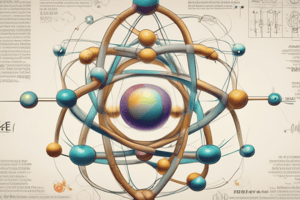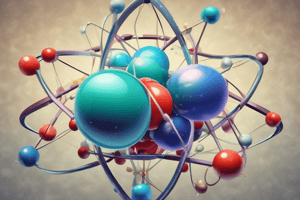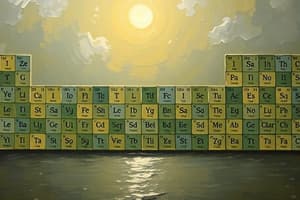Podcast
Questions and Answers
Physics investigates the fundamental interactions between objects and energy by describing them verbally.
Physics investigates the fundamental interactions between objects and energy by describing them verbally.
False (B)
Newton discovered universal gravitation by examining motion.
Newton discovered universal gravitation by examining motion.
True (A)
Maxwell's work on electric fields, magnetic fields, and charges did not lead to any technological advances.
Maxwell's work on electric fields, magnetic fields, and charges did not lead to any technological advances.
False (B)
Physics includes subjects like chemistry, biology, and geology.
Physics includes subjects like chemistry, biology, and geology.
Predictions about earthquakes and volcanic activities are not possible through the study of geology.
Predictions about earthquakes and volcanic activities are not possible through the study of geology.
Biochemistry and molecular genetics have not expanded our understanding of life's mechanisms at different levels.
Biochemistry and molecular genetics have not expanded our understanding of life's mechanisms at different levels.
Atoms are made up of four main particles: protons, neutrons, electrons, and quarks.
Atoms are made up of four main particles: protons, neutrons, electrons, and quarks.
Protons carry a negative charge within atomic nuclei.
Protons carry a negative charge within atomic nuclei.
Electrons contribute positively charged mass to atoms.
Electrons contribute positively charged mass to atoms.
Chemistry is concerned with the composition, structure, and reactions of elements only.
Chemistry is concerned with the composition, structure, and reactions of elements only.
Water boils at 100 degrees Celsius under normal atmospheric pressure due to chemistry principles.
Water boils at 100 degrees Celsius under normal atmospheric pressure due to chemistry principles.
Polymers are not used for constructing modern plastics according to physical science.
Polymers are not used for constructing modern plastics according to physical science.
Flashcards are hidden until you start studying
Study Notes
Understanding Science through its Natural World Aspects
Science, Sanskritized from the English word "saīṃśa," refers to the systematic study of various aspects of our universe and human experience. In this exploration, we will dive into some fundamental natural sciences, shedding light on their foundations with a focus on bhautik vijnān, or physical science.
Atomic Structure
The tiniest constituents of matter—atoms—form the basis of everything around us. They're made up of three main particles: protons, neutrons, and electrons. Protons carry positive charge, while neutrons have zero charge; both reside within atomic nuclei along with other smaller particles like quarks. Electrons orbit these nuclei, contributing negatively charged mass to atoms. These minute building blocks interact according to quantum mechanics principles, forming molecules and compounds essential for life itself.
Chemistry
Chemistry is concerned with the composition, structure, properties, behavior, and reactions of elements and compounds. This field explores how different combinations of atoms form unique chemical species with characteristic physical attributes and reactivities. Through chemistry, you can understand why water boils at 100 degrees Celsius under normal atmospheric pressure, what makes salt dissolve in it, and even discover novel materials like polymers used for constructing modern plastics.
Physics
Physics investigates the fundamental interactions between objects and energy and seeks to describe them mathematically. It encompasses mechanics, thermodynamics, electricity & magnetism, optics, relativity, and many more subjects. For example, Newton discovered universal gravitation by examining motion, leading to the development of fundamental laws governing celestial bodies' movement. Similarly, Maxwell demonstrated the relationships among electric fields, magnetic fields, and charges, which led to numerous technological advances such as telecommunications and computing devices.
Geology
Geology focuses on Earth's formation, evolution, processes, structures, and resources. By studying geologic time scales, rock cycles, plate tectonics, weathering, erosion, and deposition, scientists better comprehend the planet they inhabit. From this vast body of knowledge, predictions regarding earthquakes, volcanic activities, and mineral deposits are possible, safeguarding populations living near active geological hazards.
Biology
Biology deals with life and organisms, exploring how cells work together to create complex systems capable of growth, reproduction, adaptation, and response to external stimuli. Advances in biochemistry and molecular genetics have dramatically expanded our understanding of life's mechanism at every level, from gene expression to cellular function, physiology, ecology, and evolutionary theory. Insights gleaned from biological investigations guide medical practices, agricultural techniques, animal husbandry, and environmental conservation efforts worldwide.
In summary, science offers a powerful toolset to explore nature's inner workings, allowing humanity to unravel mysteries surrounding our universe and improve global quality of life. Studying each discipline provides valuable perspectives and insights into our world, fostering curiosity and innovation.
Studying That Suits You
Use AI to generate personalized quizzes and flashcards to suit your learning preferences.




